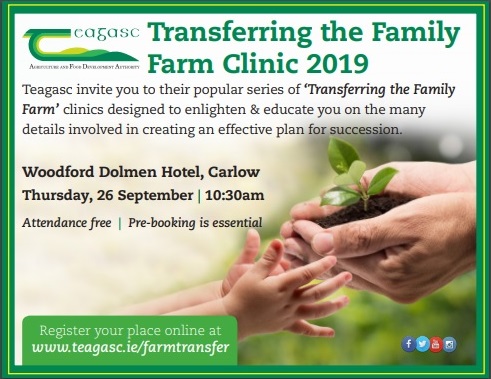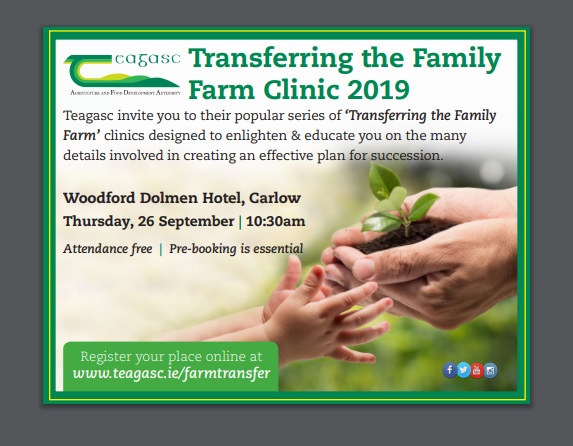Traditionally in Ireland family farms in Ireland have been passed onto the next generation on death.
In recent times social and economic changes have resulted in more transfers taking place during the owner’s lifetime. It is a very personal decision and every family has a different set of circumstances.
It is always better to have a plan in place, and by not having one it can be even more difficult if the transfer is unplanned through illness or the death of the owner.
Workshop
Teagasc are organising a workshop in the Woodford Dolmen Hotel in Carlow this Thursday, September 26.
Workshops run from 10:30 am to lunchtime. Some people don’t know where to start while others just need to tidy up details, but help is available for everyone on the day.
In many cases there is huge uncertainty and feelings run high, both with the transferor and the potential transferee.
Teagasc will cover all aspects that need to be considered when writing a succession plan. The clinic will then be open to the farm families present to go and have “one to one” private conversations with the professionals set up in booths around the venue.
Professionals in attendance will include:
- Accountants/Tax advisers
- Solicitors
- Succession mediators
- Social welfare advisers
- Citizens information
- Teagasc Education officers / Collaborative farming / financial specialists
P.L.A.N.
P = Preparation: Organise your thoughts and have a discussion early with the family. An open conversation is recommended with all those involved so misunderstandings can be avoided.
L = Legacy: Plan how the “farm” is going to be passed on. From both a tax and a legal point of view early planning is the key to reducing potential cost issues.
A = Action: Make appointments with the professional experts you require to make informed decisions.
N = Now: This is the time to get this item off the “to do” list, government policy could change significantly over the course of a few budgets. If your decision is delayed, it may be more difficult to achieve your wishes in the future.
The First Step
Make a Will. Many people put off this task as they probably do not want to think about the inevitable.
In some cases there is total denial. Starting the conversation about making the will. Don’t find yourself saying: “I don’t want our family to end up fighting like what happened with Jack’s family when he passed away.”
If there is no will the State decides what happens to your estate using the Succession Act of 1965.
Issues
Transferring the family farm is so much more than just a simple business transaction; there are a number of complex issues to be addressed including:
- The family home is normally inseparable from the business.
- A number of family members/siblings/children to be catered for fairly.
- If the transfer is during the owner’s lifetime, the owner will require an income, as well as possibly the recipient depending on the circumstances.
- Creating an arrangement that can provide a solution for the different opinions of the family members involved the discussion.
- If there are no successors, what are the options? Perhaps a partnership with a neighbour, changing to a less labour intensive enterprise, leasing out or selling some land, planting some forestry could form part of the answer.
- Sharing your story with a professional or a mediator, may help you to find the answer.
Communication
Family involvement in planning for succession is essential. A key aim must be to have an open conversation with the people involved so that misunderstandings can be avoided.
Some topics you can discuss with the professionals in attendance include:
- Writing a will/forming trusts
- Starting the conversation within the family
- Income security after retirement and pensions
- Fair deal scheme and its pitfalls
- Options to cater for other siblings
- Forming a partnership with your children
There are also a number of Tax issues to be considered. On life time transfer of farm assets, Capital Acquisitions Tax (CGT), Capital Gains Tax (CGT) and Stamp Duty are the taxes for which a return must be filed.
Reliefs may be claimed from each of these taxes. With the drop in property values during the economic downturn, the threshold of each relief has also dropped so care must be taken in planning the transfer to reduce any tax bills.
We look forward to meeting farm families on this Thursday, September 26, in Carlow to discuss what can be a difficult topic.
SEE ALSO – 78% of farmers say their farm isn’t viable without EU support
























